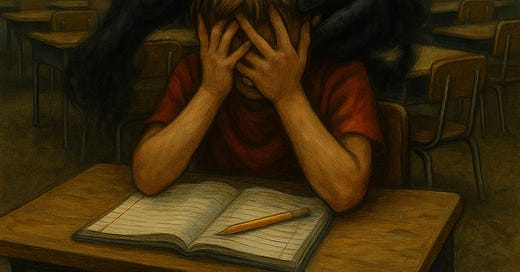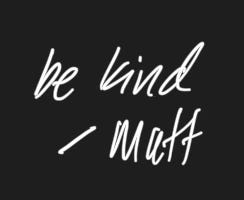Grit is Just Another Word for Endure and Obey
What starts in the classroom turns into hustle culture—for life.
I’ve heard it everywhere — as a student, a teacher, and now as a parent: “They just need more grit.”
It sounds like encouragement. But it's really a warning: we’re not going to change anything. We’re just going to ask kids to try harder.
I’ve said it too. Before I understood what I was participating in. Before I understood what I was passing on.
I’ve seen it play out over and over again. We label kids as “gritty” when they endure injustice quietly. We celebrate perseverance while ignoring pain. We praise resilience instead of asking why it was needed in the first place.
What Grit Culture Gets Wrong
Grit has become a buzzword in parenting and education. Supposedly, it’s the secret to success: the ability to keep going, grinding, striving. But here’s the truth:
Grit culture rewards survival, not growth.
We glorify students who show up no matter what, even if they’re hungry, grieving, exhausted, or scared. We tell them to “push through” instead of asking why they have to push so hard in the first place.
When a student is struggling, saying “have more grit” becomes a shortcut for adult inaction. It puts the responsibility on the child instead of on the systems and adults who could create real support.
It’s not just lazy, it’s harmful. Because grit, as it’s often taught and praised, is not neutral. It ignores trauma. It assumes equity. It reinforces the very conditions that hurt kids most.
Telling a student to just try harder is another way to say, “I’m not changing for you.”
James Baldwin once wrote:
“The paradox of education is precisely this — that as one begins to become conscious one begins to examine the society in which he is being educated.”
If that society values compliance over curiosity and endurance over evolution, then grit becomes a tool to keep students in line. Not to set them free.
Where It Leads: Hustle Culture Begins in the Classroom
I used to think I was thriving because I was the “quiet achiever.” I got my work done. I didn’t cause problems. I didn’t complain. I was praised for it.
What no one saw was the exhaustion. The anxiety. The fear that if I ever stopped, everything I was trying to hold together, or hide, would fall apart.
We don’t just teach kids to work hard. We teach them that their worth is how hard they work. That productivity is morality. That stillness is laziness. That asking for help is failure.
This is how grit becomes a gateway to hustle culture:
It starts with gold stars and perfect attendance.
It becomes unpaid overtime, ignored boundaries, and identity collapse.
It convinces us that busyness is a badge of honor, that burnout is a rite of passage, and that achievement is the only language worth speaking.
Now, as a new parent, I’m already noticing how easy it is to project expectations, even before my child can talk. I catch myself thinking ahead to milestones, to accomplishments, to how I’ll support them through challenges. And I have to pause. Not to take pride in what they do, but to root myself in who they are becoming.
I want them to know, from the very beginning, that their value isn’t in how hard they try to fit in. It’s in who they are—fully, even when they need rest.
I wasn’t just taught how to succeed. I was trained to over-function. To prove my value by how much I could endure.
That didn’t make me successful. It made me exhausted.
What Kids Deserve Instead
I don’t want to raise a child who’s praised for suffering well. I want to raise a child who knows their needs are valid. That strength doesn’t mean silence.
Kids don’t need to be taught how to endure pain. They already know. Many of them wake up in it.
What they need is space to rest. Permission to say no. Adults who adapt to the environment instead of demanding more effort.
Challenge isn’t the problem. In fact, real growth requires it. Complex thinking, creative problem-solving, learning from failure—those are the muscles we want kids to build. But those muscles don’t grow from punishment or pressure alone. They grow with feedback, reflection, and support.
The issue is how we frame and facilitate challenges. Too often, we disguise cruelty as character-building: asking students to endure without clarity, fail without feedback, and persist in silence rather than be curious out loud.
What they need isn’t ease. It’s the safety and encouragement to take intellectual risks, to get it wrong, and still feel like they belong. That kind of learning takes nuance, reflection, and the courage to keep going. Not because they were forced to—but because someone believed they could.
They need healing-centered spaces, not trauma-informed buzzwords. They need people who believe them the first time.
In the classroom, I learned the same lesson: praising grit doesn’t create strong students. It creates silent ones — students who believe effort alone should equal learning, because that’s what we’ve taught them to value. Not growth. Not feedback. Just endurance.
We say we want to raise “resilient” kids, but resilience isn’t the goal.Safety is. Joy is. Agency is.
Students are not empty vessels. They bring brilliance, barriers, and experience. Our job is not to make them tougher. It’s to build a world where toughness isn’t the only way to survive.
Baldwin said:
“The obligation of anyone who thinks of himself as responsible is to examine society and try to change it — and to fight it, at no matter what risk.”
That obligation extends to us—not to make kids tougher, but to make the world more just.
What to Do Instead of Saying “Try Harder”
Here’s what I try to do now—as a parent, as a teacher, as someone still unlearning:
Listen when a kid says they’re tired, frustrated, or done. That’s not a weakness. That’s honesty.
Adapt the system, not the child. If your classroom or home requires silence to succeed, it’s not working.
Stop rewarding suffering. Praise problem-solving (especially when it includes failure), curiosity, rest, and boundary-setting.
Challenge hustle culture early. Help kids understand that their value isn’t tied to how much they produce.
Be the adult who changes. Don’t make your growth their burden—and maybe stop over-programming every second of their day.
Grit doesn’t make a system just. It makes oppression easier to ignore—and we dress it up as character.
Hustle culture doesn’t build integrity. It just wears people down.
If we are to take Baldwin’s charge seriously, then education, and parenting, must not teach kids to endure injustice.
It must teach them to name it, resist it, and transform it.







I have a hobby of saving fortune cookie papers with the advice or philosophy on them. One of them goes like this: "idleness is the holiday of fools".
But what does it say about the mind of the creator who is probably from the culture in China? Or Japan.
You must always be productive. Working. No time to pause and think. No time for self-renewal. No time to relax and regroup. Or recharge. No time for self-renewal. Work work. Put on the right face. Move ahead. Don't stop.